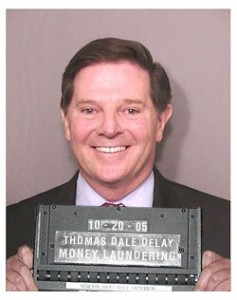Suing For Wrongful Termination And Stopping Corporate Fraud Under The Sarbanes-Oxley Act
It’s always nice to see when a universal scumbag finally gets his comeuppance. It’s especially cathartic when that scumbag is Tom DeLay, or as he’s known to anyone in America who’s not in the top 10 percent income bracket, the reason why it seems harder and harder to trust the government these days. Not only is Delay the reason why I thought these Onion articles could be real, but he also unfortunately epitomizes what’s wrong with Washington DC politics, the legislative process, and most of all the corporate entity.
 Though the fallout of DeLay’s mess isn’t all bad. Thanks to all his money laundering and various other frauds finally being brought to light, his and his fellow corrupt contemporaries’ horrible acts of criminal deceit laid the way for some sanity and fairness to finally come to pass.
Though the fallout of DeLay’s mess isn’t all bad. Thanks to all his money laundering and various other frauds finally being brought to light, his and his fellow corrupt contemporaries’ horrible acts of criminal deceit laid the way for some sanity and fairness to finally come to pass.
The Sarbanes-Oxley Act is the first in what I hope will be many more legislative acts of its kind. Though passed in 2002, three years prior to DeLay’s indictment, thanks to DeLay and the continually parade of newly-outted others of his ilk, the legal challenges that followed the Act’s passage were made all the easier to strike down.
The Act imposes a number of new requirements on corporations that are designed to prevent fraud and protect employees and investors, while also holding those who commit the violations criminally and civilly liable. Essentially, the Act requires corporations to fully report their finances to the Securities and Exchange Commission. This includes so-called “off-balance sheets” which is a fancy accounting term meaning the part of a corporation’s income report where they’re hiding their massive losses. This is to help ensure the kind of financial disasters our country’s economy has been taking suffering through lately won’t happen again.
However more importantly, the Sarbanes-Oxley Act not only allows whistleblowers to report financial fraud to the SEC, but also requires it. Prior to the enactment of the Act, corporate insiders were under no duty to report fraud as they possessed a fiduciary duty to their employer. Sarbanes-Oxley created an exception to this fiduciary duty that allows employees who discover fraud to report it to an outside agency like the SEC. Employees are supposed to do this after they first bring the fraud to the attention of their superiors, reporting up the chain of command until someone within the company finally acts to correct it. If no one does, then the employee must report the fraud to the SEC.
As you can probably tell, this Act isn’t all too appreciated by the corporations out there, who’ll probably be pretty angry at the employees who rat them out. Fortunately for the employees, Sarbanes-Oxley not only protects employees by preventing corporate employers from firing whistleblowers acting in compliance with the Act, but also allows these employees to sue for wrongful termination if they are terminated in retaliation.
In a sense, Sarbanes-Oxley has created a new class of protected employee: the corporate whistleblower.
So, for all you corporate employees out there who know your bosses are cheating Uncle Sam, remember you have a duty to make sure they stop doing it. And if they don’t, report them. It’s not only the right thing to do because it will protect your and the public’s livelihood in the long run, but also because you won’t have to worry about them canning you. And if they do, well, then they just threw themselves in a pretty expensive wrongful termination lawsuit. Just remember to take the proper steps before you act though, and if you’re still not sure on how to proceed, ask an attorney – that’s what they’re for after all.

Comments